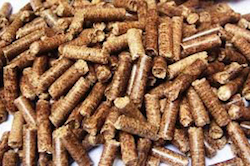Sumitomo Corporation has signed a contract to acquire up to 20 percent of Cosan Biomassa, a producer of sugarcane pellets for power generation. With an eye on Asia’s need to reduce fossil fuel use and meet goals as set forth in the Climate Treaty last December, the partnership between Sumitomo and Cosan will focus on increasing exports to Japan and Europe as well as increase domestic sales.
 According to a press statement, the state of Sao Paulo has the collective production potential of 45 million tons/year of sugarcane pellets. The venture has set forth a goal to produce 2 million tons by 2025 and as much as 8 million tons/year in the future. Cosan Biomassa has developed a fuel pellet made from sugarcane residues such as bagasse from the sugar mill and straw left over in the sugarcane field, and built a large-scale production plant with an annual capacity 175,000 tons that went into commercial production in December 2015.
According to a press statement, the state of Sao Paulo has the collective production potential of 45 million tons/year of sugarcane pellets. The venture has set forth a goal to produce 2 million tons by 2025 and as much as 8 million tons/year in the future. Cosan Biomassa has developed a fuel pellet made from sugarcane residues such as bagasse from the sugar mill and straw left over in the sugarcane field, and built a large-scale production plant with an annual capacity 175,000 tons that went into commercial production in December 2015.
“Brazil is already among the largest producers and exporters of agricultural commodities in the world. Pelletized biomass is a new commodity being created to serve the low carbon economy,” said Mark Lyra, Cosan Biomassa CEO. “By making use of sugarcane residues and benefiting from the economic and environmental advantages that the shift to rail logistics brings to the game, Brazil is positioned to become the Saudi Arabia of renewable energy.”
Sumitomo Corporation has targeted biomass energy as a promising source of renewable energy, and began importing biomass fuel for power generation to Japan in 2008.
“By the year 2030, we foresee that Japan will consume as much as 10 million+ tons of pelletized biomass, the majority of which would come from overseas. Renewable energy including biomass will play a prominent role in our power generation sector by that time,” said Yoshinobu Kusano, general manager, Biomass Business, Sumitomo Corporation. “We believe a relevant portion of this demand will be met by agricultural waste, particularly sugarcane biomass pellets produced in Brazil. Sugarcane’s productivity and abundant availability tied to the fact that we are using its residual byproduct as a raw material gives us a unique sustainability condition when compared to other biomass sources in the world.”

